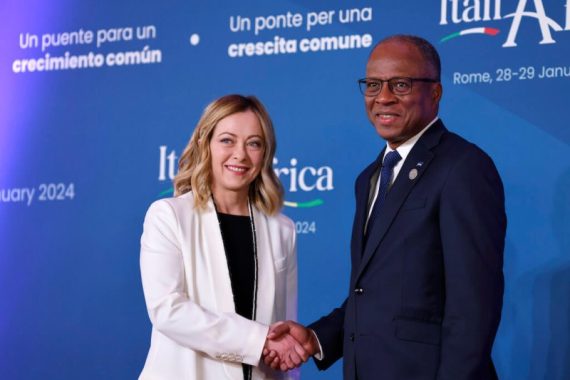I
taly’s Prime Minister Giorgia Meloni hosted African leaders in Rome on Monday to unveil her long-anticipated development plan for Africa, known as the Mattei Plan. This initiative, aimed at reshaping Italy’s relations with African nations, comes at a crucial time when global powers are intensifying their presence on the African continent.
Prime Minister Meloni, known for her far-right stance on migration, introduced the Mattei Plan, a strategic vision inspired by Enrico Mattei, founder of Italy’s state-owned energy giant Eni. The plan positions Italy as a pivotal bridge between Africa and Europe, proposing a unique approach – swapping energy investments for efforts by African nations to curb migration, particularly across the Mediterranean Sea.
The Mattei Plan, initially funded at €5.5 billion ($5.9 billion), includes investments in various sectors such as energy, agriculture, water, health, and education. Meloni envisions Italy becoming a central energy gateway, aligning with European countries’ goals to reduce dependence on Russian gas.
Global context and critics’ concerns
This ambitious plan unfolds against the backdrop of Italy’s heightened interest in Africa and its G7 presidency in 2024. However, critics argue that Italy, burdened by substantial debt, may struggle to compete with other global players like China, Russia, and Gulf states, all vying for influence in Africa. Some detractors also highlight the plan’s emphasis on fossil fuels, calling for a more substantial focus on renewable energy to address the urgent needs of over 40% of Africans lacking energy access.
As Italy engages with Africa, the Mattei Plan intersects with broader foreign policy objectives. It follows Prime Minister Meloni’s recent visit to Turkey, where she aimed to strengthen ties with key nations. Italy seeks to expand trade and defense deals while addressing migration challenges collaboratively, notably with Libya.
The summit, titled “A bridge for common growth,” witnessed representatives from more than 25 countries, including European Commission President Ursula von der Leyen and officials from UN agencies and the World Bank. Meloni hailed the summit as successful, emphasizing the potential for cooperation, particularly in the energy sector.
However, discord emerged during the summit, with Moussa Faki Mahamat, Chairman of the African Union Commission, expressing the desire for prior African consultation on priorities. He stressed the need to move from promises to concrete actions, urging participants to honor commitments.
Italy’s geostrategic focus and global competitions
Italy’s strategic focus on Africa aligns with a global trend where major powers are expanding their influence on the continent. While Italy aims to position itself as a key player, it faces stiff competition from other nations actively engaging with Africa, including China, Russia, India, Japan, and Turkey.
The Mattei Plan involves pilot projects addressing issues at the root of migration, such as modernizing grain production in Egypt, purifying water in Ethiopia, and providing renewable energy training in Morocco. The success of these initiatives will depend on effective collaboration, addressing concerns of African nations, and navigating the complexities of international partnerships in a highly competitive global context.
Italy’s diplomatic initiatives under Prime Minister Giorgia Meloni mark a significant shift in strategy, positioning the country as a key actor on the global stage. As the Mattei Plan unfolds, its repercussions are poised to reverberate throughout the African continent and European geopolitics in the coming years. Italy’s diplomatic ambitions, encompassing both Africa and Turkey, indicate a calculated effort to carve out a unique and influential role in the ever-evolving landscape of international relations.
India and Italy
In a poignant reflection on the robust relationship between Italy and India, Italian Ambassador Vincenzo De Luca highlights the strides made in bilateral ties throughout 2023. With Italy poised to assume the G7 presidency in 2024, the Ambassador acknowledges India’s exemplary role in addressing global concerns and underscores the mutual commitment of both nations to building a stable and interconnected world.
Italian Prime Minister Giorgia Meloni’s visit to India in March 2023 marked a watershed moment in bilateral relations. The meeting with Prime Minister Narendra Modi set the stage for a new era of collaboration, emphasizing key areas such as defense, space, connectivity, and energy transition. A joint statement emerged, providing a robust framework for future cooperation.
The diplomatic momentum continued with PM Meloni’s visit to India for the G20 summit in September. This engagement facilitated high-level talks, involving Deputy PM and Foreign Affairs Minister Antonio Tajani, Defense Minister Rajnath Singh, and Commerce Minister Piyush Goyal from Italy, along with India’s External Affairs Minister S Jaishankar and Defense Minister Rajnath Singh. These interactions solidified the foundation for a multifaceted partnership.
Recommended
Turkey and Italy
Italian Prime Minister Giorgia Meloni embarked on her inaugural official trip abroad since Italy assumed the presidency of the Group of 7 countries, visiting Istanbul to meet with Turkish President Recep Tayyip Erdogan. The encounter, held on January 21, 2023, signifies a concerted effort to enhance diplomatic and economic collaboration between the two nations.
Meloni and Erdogan, during their discussions, expressed a mutual ambition to elevate bilateral trade between Italy and Turkey. Officials, briefed on the talks, revealed that the two governments are targeting a substantial increase, aiming to boost the trade value to $32.7 billion (€30 billion) by the year 2030. This ambitious goal represents a significant surge from the current €25 billion trade volume.
Notably, the discussions also touched upon defense collaboration, with potential deals involving Italy’s prominent aerospace and security firm, Leonardo SpA. The prospect of joint ventures in the aerospace and security sectors underscores the commitment to fortifying strategic partnerships beyond economic ties.
Sources: Anadolu Agency, Reuters





